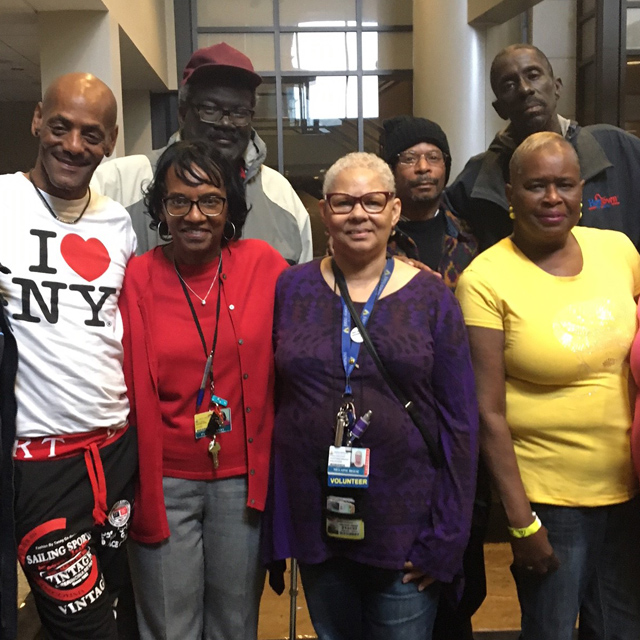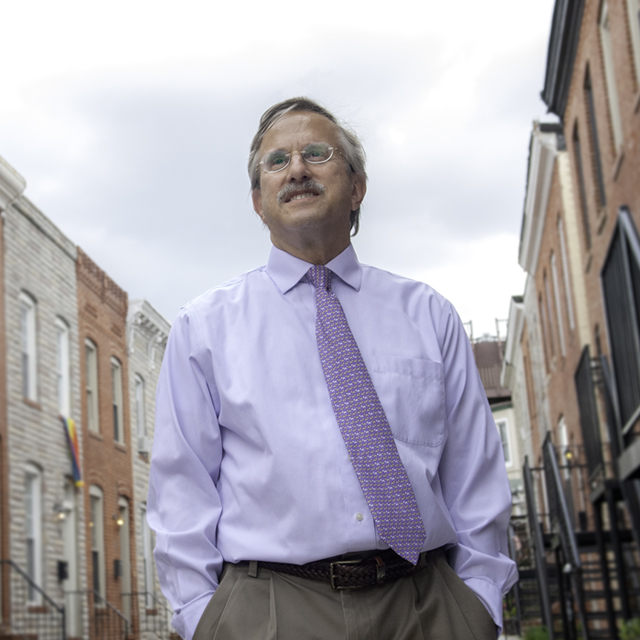Left to right: Panagis Galiatsatos, Kimberly Monson and Dan Hale host a twice-weekly telephone call that delivers the latest COVID-19 information and resources to leaders of Baltimore’s underserved communities. (Photo: Will Kirk)
Each week seems to bring new — and sometimes conflicting — recommendations about the coronavirus that causes COVID-19. Will face masks slow the spread? (Yes) Should I take hydroxychloroquine? (No) Will the flu shot I got last fall protect me against COVID-19? (No)
But no one disputes the outsize effect the COVID-19 pandemic continues to have on African American communities across the United States.
Two organizations based at Johns Hopkins Bayview Medical Center are working together to bring reliable, up-to-date news and knowledge to communities hit hardest by the new coronavirus. Already dedicated to supporting underserved communities in Baltimore, the Healthy Community Partnership (HCP) and Medicine for the Greater Good are building on their strong relationships with community leaders to reach the congregations and neighborhoods they represent.
“People need a basic understanding of the coronavirus and the importance of adhering to precautions that can reduce the risk of becoming infected,” says Dan Hale, director of HCP. “They also need encouragement and support as they make adjustments like social distancing in their lives to stay safe.”
Along with HCP program coordinator Kimberly Monson and Medicine for the Greater Good co-director Panagis Galiatsatos. Hale hosts COVID-19 Community Partners Calls. Each hourlong conference call addresses the latest news about the pandemic and shares strategies for coping with conditions stemming from the virus. The hosts also invite a different guest expert to each call.
The discussions, which take place on Mondays and Fridays, feature vital details about epidemiology and mental and emotional health, as well as resources for food, employment and housing, and other assistance available around Baltimore.
Sorting Out ‘Facts from Rumors’
Across America, COVID-19 has ravaged underserved communities, particularly majority Black areas. Estimates vary, but a study published in the Journal of the American Medical Association in April that relied on data collected by Johns Hopkins University researchers points to startling statistics: In 131 predominantly Black U.S. counties, the rate of infections is three times greater than in predominantly white counties. And the mortality rate is six times higher.
Better Health for All
In Baltimore, as of June 3, African Americans accounted for 45% of coronavirus infections, as opposed to whites at only 13%. Two-thirds of the city’s COVID-19 deaths are among Black residents, while white Baltimoreans make up 18%. The virus has infected Baltimore’s Latino population at a rate of 19.3 per 1,000 residents — far higher than other ethnicities.
“We could see early on in the pandemic that people in underserved communities were going to need reliable information,” says Galiatsatos. “We thought a regular phone call might be a good way to help people sort out facts from rumors.”
Though all callers are welcome, the COVID-19 Community Partners Calls are designed for leaders from neighborhood and housing associations, recreation centers, and churches, mosques and other faith organizations who can share trustworthy material with the people they represent.
Callers email their questions to Monson, who passes them along to Galiatsatos or a guest expert who is also on the line. Answers are brief and tailored for lay audiences.
Monson receives numerous emails and phone calls from grateful participants. “Each call has given a wealth of information that our community needs,” writes one. “I share the calls with church members, friends and residents of a senior apartment building where I live.”
Another caller praises the spiritual element of the updates — each ends with a prayer or meditation led by a member of the Johns Hopkins Medicine Department of Spiritual Care and Chaplaincy staff:
“You are doing a splendid job in calming my mind, body and spirit. I hang up being better informed, and feel I am presented with honesty and truth. The presence and idea of individuals of faith being able to give us encouragement fortifies the power of these sessions.”
Exceeding Expectations
The first Community Partners Call, held March 16, drew more than 100 callers — a larger-than-expected audience, according to Monson. Since then, nearly 2,000 people have dialed in, with as many as 202 participants on the line. Social media and word of mouth have been the main drivers of attendance. Medicine for the Greater Good and the Healthy Community Partnership plan to keep the calls going, even after regular activities resume.
“The updates have really exceeded our expectations,” Monson says. “Initially, we reached out to people we already had relationships with. But as word spread, the interest grew. I’m adding new names to our list of contacts almost daily.”
In addition to providing important details and resources about the coronavirus and how to avoid it, each call features a guest with expertise relevant to the COVID-19 crisis. Recently, Neda Gould, associate director of the Johns Hopkins Bayview Medical Center Anxiety Disorders Clinic, discussed the mental and emotional challenges of living through the pandemic and offered access to her free online meditation workshops. On another call, Sherita Golden, Johns Hopkins Medicine vice president and chief diversity officer, spoke about the disparity in COVID-19 cases and treatment that affects people of color.
Other recent speakers included leaders from Maryland Legal Aid and the House of Ruth Maryland, an intimate partner violence shelter. On one call, Michael Harrison, Baltimore police commissioner, answered participants’ questions about public safety during the pandemic.
A Longstanding Commitment
Disseminating important information to underserved people via their community leaders is a model that both Johns Hopkins Bayview groups have employed for years. The COVID-19 Community Partners Calls are extensions of HCP’s mission to engage Baltimore’s faith communities in passing on advice about such issues as diabetes management, nutrition and health literacy. Founded by Hale and Johns Hopkins Bayview President Richard Bennett in 2011, the partnership has reached thousands of Baltimore residents.
Galiatsatos co-founded Medicine for the Greater Good with Johns Hopkins Bayview geriatricians Colleen Christmas and Ariel Green in 2013. The program trains medical residents and other health care professionals to consider socioeconomic status, education, employment and other social determinants of health when they treat patients.
The organization’s other primary goal, according to its website, is to “promote health and wellness through an interactive and engaging partnership with the community.” Galiatsatos sees the conference calls as a way to help meet that objective.
An important component of each call, he says, is to dispel the misinformation and conspiracy theories about the coronavirus that proliferate on social media.
On a call in early June, for instance, Galiatsatos discussed a falsehood that if a person can hold their breath for a certain number of seconds, it proves they do not have the virus. On the same call, he addressed a myth that alcoholic drinks can kill the coronavirus. Galiatsatos explained that, while there is a certain logic to the story — ethyl alcohol, after all, is a germicide — beer, wine or spirits do not prevent coronavirus infections.
Galiatsatos attributes the high number of call participants to the trust that Medicine for the Greater Good and the Healthy Community Partnership have nurtured among themselves and the community leaders on the calls.
“It’s important for callers to know that this is a dialogue,” he says. “We certainly don’t have all the answers when it comes to COVID, but what we have, we share.”


